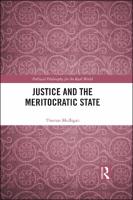Justice and the Meritocratic State
Proposal review
| dc.contributor.author | Mulligan, Thomas | |
| dc.date.accessioned | 2021-04-01T14:02:59Z | |
| dc.date.available | 2021-04-01T14:02:59Z | |
| dc.date.issued | 2018 | |
| dc.identifier | ONIX_20210401_9781351980777_4 | |
| dc.identifier | OCN: 1051320611 | |
| dc.identifier.uri | https://library.oapen.org/handle/20.500.12657/47576 | |
| dc.description.abstract | Like American politics, the academic debate over justice is polarized, with almost all theories of justice falling within one of two traditions: egalitarianism and libertarianism. This book provides an alternative to the partisan standoff by focusing not on equality or liberty, but on the idea that we should give people the things that they deserve. Mulligan sets forth a theory of economic justice—meritocracy—which rests upon a desert principle and is distinctive from existing work in two ways. First, meritocracy is grounded in empirical research on how human beings think, intuitively, about justice. Research in social psychology and experimental economics reveals that people simply don’t think that social goods should be distributed equally, nor do they dismiss the idea of social justice. Across ideological and cultural lines, people believe that rewards should reflect merit. Second, the book discusses hot-button political issues and makes concrete policy recommendations. These issues include anti-meritocratic bias against women and racial minorities and the United States’ widening economic inequality. Justice and the Meritocratic State offers a new theory of justice and provides solutions to our most vexing social and economic problems. It will be of keen interest to philosophers, economists, and political theorists. | |
| dc.language | English | |
| dc.relation.ispartofseries | Political Philosophy for the Real World | |
| dc.subject.other | Anarchy | |
| dc.subject.other | A Theory of Justice | |
| dc.subject.other | capital | |
| dc.subject.other | consequences | |
| dc.subject.other | cronyism | |
| dc.subject.other | David Miller | |
| dc.subject.other | desert | |
| dc.subject.other | desert-based theory of justice | |
| dc.subject.other | distributive justice | |
| dc.subject.other | economic justice | |
| dc.subject.other | egalitarianism | |
| dc.subject.other | equality | |
| dc.subject.other | equal opportunity | |
| dc.subject.other | essentialism | |
| dc.subject.other | George Sher | |
| dc.subject.other | inheritance tax | |
| dc.subject.other | intuition | |
| dc.subject.other | John Rawls | |
| dc.subject.other | Justice and the Meritocratic State | |
| dc.subject.other | justice | |
| dc.subject.other | libertarianism | |
| dc.subject.other | liberty | |
| dc.subject.other | meritocracy | |
| dc.subject.other | meritocratic public policy | |
| dc.subject.other | nepotism | |
| dc.subject.other | personal identity | |
| dc.subject.other | political philosophy | |
| dc.subject.other | public policy | |
| dc.subject.other | Robert Nozick | |
| dc.subject.other | State, and Utopia | |
| dc.title | Justice and the Meritocratic State | |
| dc.type | book | |
| oapen.identifier.doi | 10.4324/9781315270005 | |
| oapen.relation.isPublishedBy | 7b3c7b10-5b1e-40b3-860e-c6dd5197f0bb | |
| oapen.relation.isbn | 9781351980777 | |
| oapen.relation.isbn | 9781315270005 | |
| oapen.relation.isbn | 9780367372286 | |
| oapen.relation.isbn | 9781138283800 | |
| oapen.imprint | Routledge | |
| oapen.pages | 238 | |
| peerreview.anonymity | Single-anonymised | |
| peerreview.id | bc80075c-96cc-4740-a9f3-a234bc2598f1 | |
| peerreview.open.review | No | |
| peerreview.publish.responsibility | Publisher | |
| peerreview.review.stage | Pre-publication | |
| peerreview.review.type | Proposal | |
| peerreview.reviewer.type | Internal editor | |
| peerreview.reviewer.type | External peer reviewer | |
| peerreview.title | Proposal review | |
| oapen.review.comments | Taylor & Francis open access titles are reviewed as a minimum at proposal stage by at least two external peer reviewers and an internal editor (additional reviews may be sought and additional content reviewed as required). |

